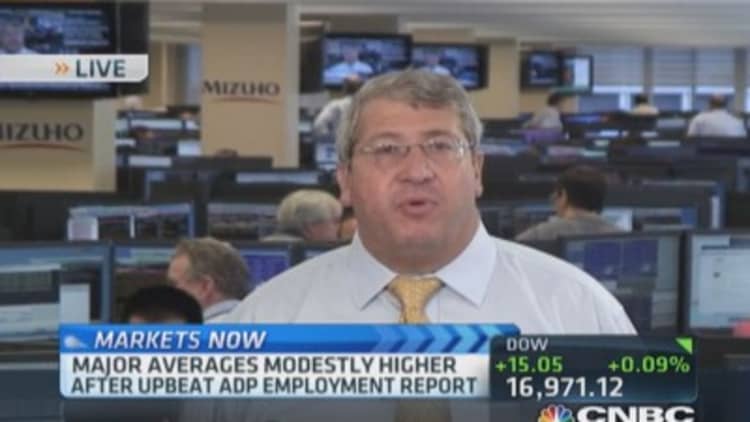The National Association for Business Economics produced some figures in its quarterly Business Conditions survey yesterday that ought to raise the eyebrows of anybody who has been paying attention to the debates over the pace of the economic recovery and, specifically, the persistently high unemployment rate.
The news was virtually all good when NABE members gathered for a teleconference with the news media on Monday to discuss a poll of 85 business economists.
"Panelists have become more sanguine about the overall economic outlook," said Ken Simonson, survey analyst and chief economist, Associated General Contractors of America. "Nearly one-quarter of respondents expect growth in the economy over the next 12 months to exceed 3 percent. That's triple the share who expected this higher growth rate in the previous survey figure. As before, none of the survey respondents expects growth to be negative."
The majority of survey participants represents businesses with 100 employees or more, and 40 percent represent firms with more than 1,000 workers.
More from The Fiscal Times:
In NYC, Front Doors Are for the One Percent
Why Europe is Hesitant to Punish Russia
Credit Cards at College: Making Smart Choices from Day One
One of the most encouraging findings was that in the second quarter of 2014, only 22 percent of respondents reported that they faced a shortage of skilled workers, down dramatically from the 33 percent who reported problems finding workers this time last year.
When you think about it, though, that finding is pretty counterintuitive. One of the biggest complaints from the business community for the past several years has been the difficulty of attracting skilled workers. If they are so in demand, surely they ought to be scooped up the moment they become available.
The U.S. economy has produced something like 1.2 million new jobs in the last year, meaning that more and more of the unemployed have found work. Indeed, the unemployment rate in the U.S. fell from 7.5 percent this time last year to 6.1 percent today.
Read MoreNABE survey points to rising US wage pressures
If more people have found jobs, though, and a smaller percentage of the population is out of work, it seems at first glance that firms should be finding it harder, not easier, to attract skilled workers.
"It's the opposite of what I would have expected," conceded Simonson in an interview after the teleconference, though he said that he still hears complaints about the difficulty of finding skilled construction workers.
Brookings Institution Economist Gary Burtless says the mysterious appearance of more skilled workers might be explained by another finding of the NABE study: After years of barely keeping pace with inflation, wages have been starting to rise.

According to the study, 43 percent of respondents "reported that their firms raised wages last quarter, the third straight quarterly rise in that share and more than double the share reporting increases a year ago." It also found that an additional 35 percent expect to raise wages in the third quarter.
Read More
With unconcealed sarcasm, Burtless wondered whether the sudden availability of skilled workers, "might be linked" to rising wages.
"The story that there is a structural mismatch between the needs of expanding employers and the skills of the people waiting on the sideline…is based mainly on anecdotal evidence from individual companies," he said.
When business owners complain about having difficulty filling jobs, Burtless said, "What's always surprised me is the business journalists who decline to ask the obvious follow-on question: Have you tried offering them more money? Better benefits?"
"It's cheap to say there is a mismatch in skills. It's a little more expensive to pay workers more," he said.
Read MoreWage inflation is a good thing: Pimco's McCulley
Another possible explanation for the increased availability of skilled workers is that Federal Reserve Board Chair Janet Yellen has been correct in her assessment that discouraged workers will return to the workforce as the economy improves.
Yellen has said a number of times that she expects labor force participation to improve, at least somewhat, as the economy grows, and businesses seeing more skilled laborers available for hire might be a function of skilled individuals who had given up looking for work finding their way back into the labor market.
—By Rob Garver, The Fiscal Times

